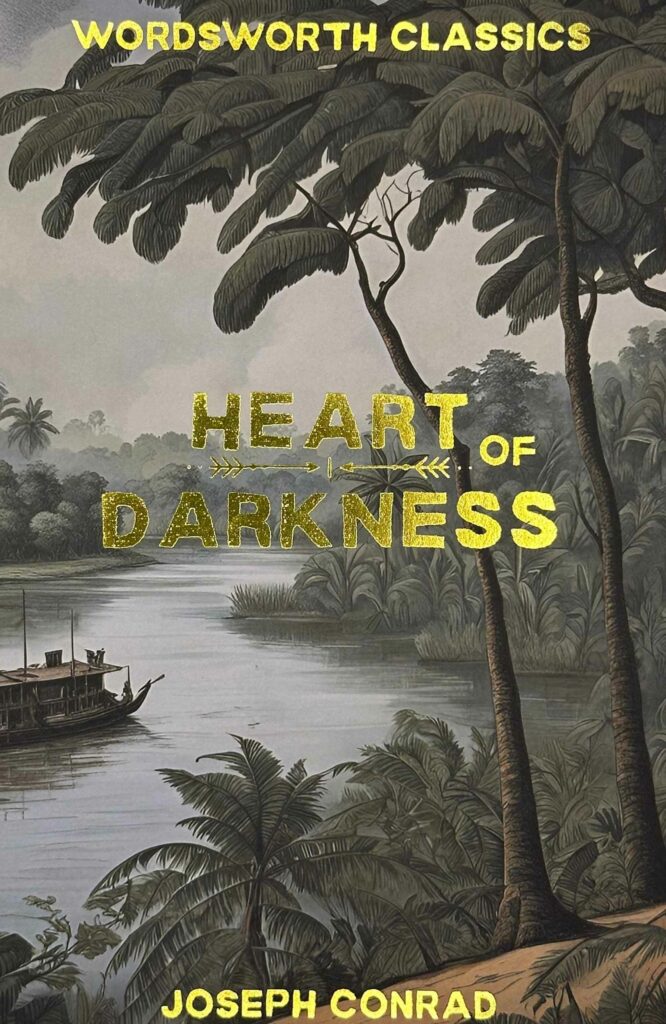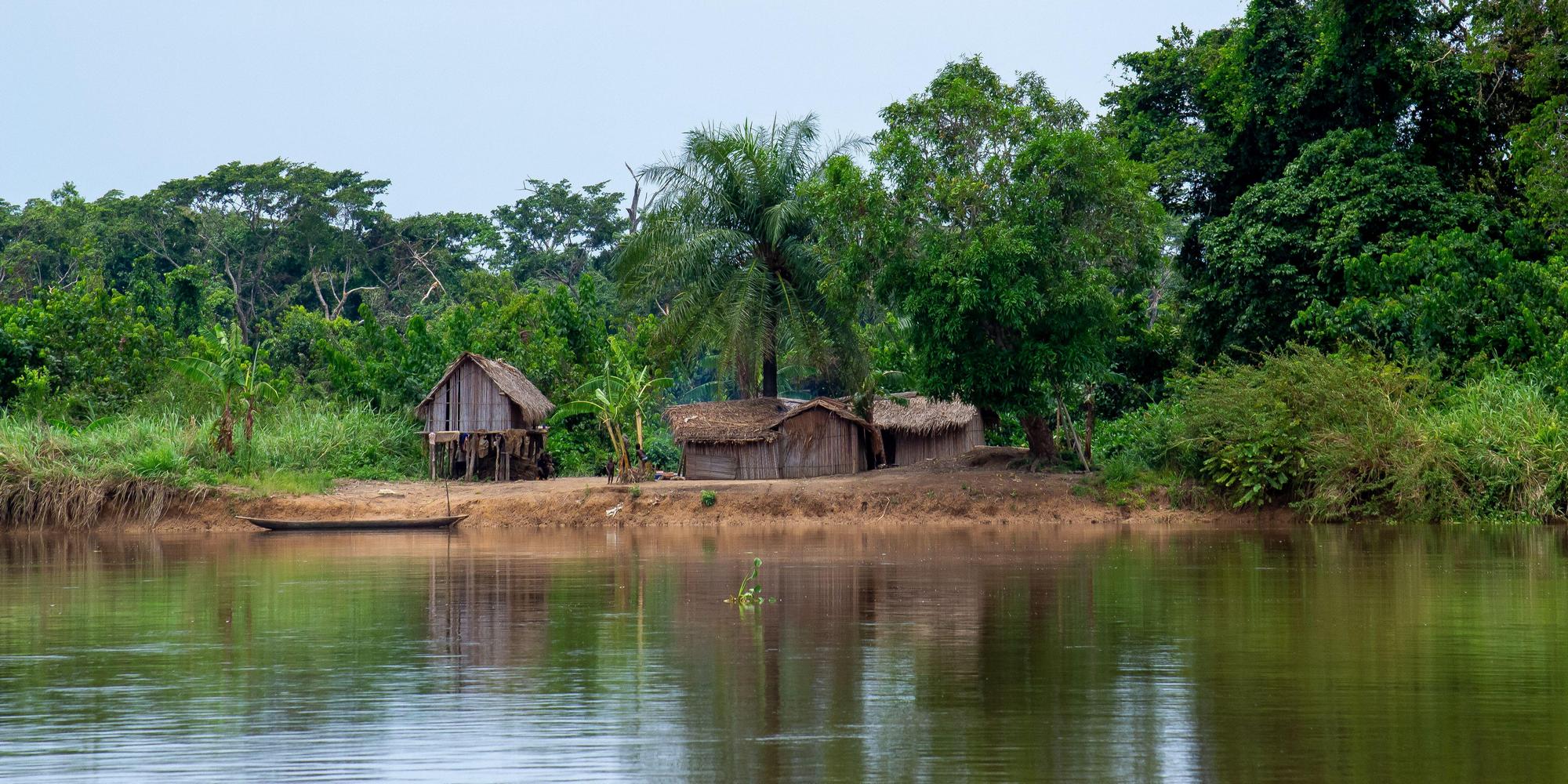
Sally Minogue reconsiders Joseph Conrad’s Heart of Darkness
‘And this also has been one of the dark places of the earth’. As we all recalibrate our understanding of Empire, Sally Minogue reconsiders Joseph Conrad’s Heart of Darkness, in the first of a short series of blogs on literature and colonialism.
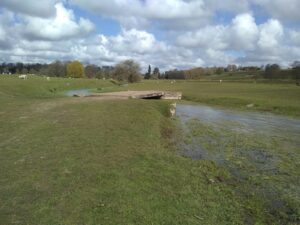
Nailbourne 2021
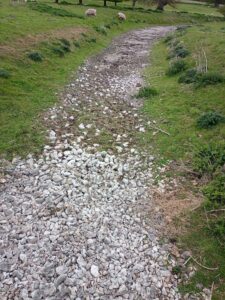
Nailbourne 2022
A few months ago, in the balmy Spring weather, I walked with friends through what felt like quintessentially English countryside. Actually it was Kentish parkland, and in the context of a fine early 18th century house, it was undoubtedly constructed in the image of an ideal of nature, rather than being a product of nature itself. Whoever designed Bourne Park was skilled indeed. As we walked amongst grazing sheep, on green sward, willows in the near distance, a glimpse of a stretch of water, and unfolding beyond fields, hedges, copses – all felt happily natural. Such landscapes were in their origin highly controlled, even using the ha ha (a hidden ditch) to give the impression of garden rolling inexorably into countryside with grazing animals in the near view, at the same time ensuring that those animals couldn’t stray into the environs of the house. (It is the device that gives Glyndebourne its sense of the bucolic.) But there is one force of nature in Bourne Park that doesn’t admit of human control: the Nailbourne, a stream that rises as it wills then disappears leaving a perfectly scooped dry bed, a deep shadow of a river. This April it was dry. Last April at exactly the same time, as Google photos reminds me, it was in full spate. Though its rising is usually associated with wet winters, no-one knows or can predict when it will appear or disappear. As a result, magical myths have grown up round it, including one suggesting that St Augustine caused the waters to flow, analogously with his bringing the waters of Christianity to Kent and thus to Britain.

Oswald’s
Our walk was from the village of Bridge to Bishopsbourne. And you may well be wondering, with a little irritation as I perambulate, what this has to do with Empire and the importance of rediscovering the colonial dimensions of literature. So: our walk was to the Kent village of Bishopsbourne, where Joseph Conrad spent the last years of his life (from 1920 to 1924), in Oswalds, a handsome but comparatively modest house settled next to the church, and looking out over the parkland just described. Conrad was born (1857) in Berdychiv, once part of the Crown of the Kingdom of Poland, at the time of his birth Ukraine, but under the rule of the Russian Empire. Conrad’s family belonged to Polish nobility, powerful as landowners, yet dispossessed in terms of nationality. Conrad’s father was actively involved in Polish nationalist resistance to Russian rule. So Conrad was of an elite, but one that was subjugated under Russian rule. His father’s nationalist struggles must have had a significant effect on his own sense of (Polish) identity. Yet he ended up as a celebrated writer in English, with English citizenship (taken in 1886, aged 29), living in the garden of England.
The fracture between Conrad’s beginnings and his end must give us pause when we look at his work in relation to Empire. Here is no ordinary great white male inscribing his entitlement onto his representation of the imperialist enterprise. Rather he must have had a sense of the contiguity between one oppressed people (the Polish) and another (the Congolese African), even though his aristocratic origins also distanced him from them. He wrote, by choice, in a non-native language. His subsequent seafaring wanderings, largely with the British merchant navy between 1878 and 1894, can only have strengthened his sense of a deracination at the heart of life. It was in the latter part of this long marine life, in 1890, that he undertook his working trip to the Congo, then the personal fiefdom of King Leopold II of Belgium. It is this trip that informs in detail the larger imaginative span of Heart of Darkness.
Let’s look first at the novel as it was standardly seen during the first three-quarters of the 20th century. First published in serial form in Blackwood’s Magazine in 1899, it was then published in book form in 1902, alongside other of Conrad’s shorter works, as Youth: A Narrative, and Two Other Stories. The dates here are significant. To put it into context, Bram Stoker’s Dracula had been published in 1897 – a novel that we can now reread as investigating new elements of modernity, but one which is still firmly grounded in late Victorian tropes. 1910 – the date ‘on or about’ which, according to Virginia Woolf, ‘human nature changed’ – still lay way ahead. The rupture of the First World War was unforeseeable. So Conrad’s novel is in its moment remarkable, since it both addresses critically the shibboleth of imperialism (what other novelist was doing that at the time?), and through that opens up ‘“The horror! The horror!”’ – unspecified, unnameable, the void at the heart of existence. This ‘horror’ would be firmly inscribed into the 20th century’s most powerful movement, Modernism, when T. S. Eliot invoked it by using the quotation, ‘Mistah Kurtz – he dead’, as the epigraph for The Hollow Men, the poem which in 1925 followed his 1922 icon of Modernism, The Waste Land.
Soon, then, Conrad’s novel came to be seen as a precursor of Modernism, and then as a central Modernist text (to which its shifting narrative framework and ironic point of view contributed). Somewhere in that process, the fact that this was a novel about Africa, and specifically about the Congo, fell into the background. When a historical reading did come to the foreground, the novel was seen as healthily critical of imperialism. But predominantly, the symbolic dimensions of that ‘heart of darkness’ were allowed to carry the weight of la condition humaine, without any clear thinking about the way individual humans were represented – not, at any rate, African ones. And even that generalizing term ‘African’ is indiscriminate.
When I was myself a student of the novel, in the mid-sixties, this symbolic reading, putting the darkness of Africa, with all the difficulties those terms entailed, in the service of an existential darkness, was unproblematised. But that wouldn’t remain the case for long. Chinua Achebe, celebrated author of Things Fall Apart (1958), which set African writing centre stage, gave a lecture in 1975 entitled ‘An Image of Africa: Racism in Conrad’s Heart of Darkness’. In these days of Black Lives Matter, it is difficult to imagine the extraordinary impact of Achebe’s calling Conrad a racist. Calling out racism was still not common at that time, and to apply it to a cherished literary text even less so. This was perhaps the real power of Achebe’s lecture (subsequently published), that he reminded us that literary texts matter in the fabric of our actual lives. How we read Heart of Darkness is continuous with how we see ourselves and each other – which sometimes becomes the ‘other’, and allows us to dehumanise and distance those who are one with our common humanity. There’s no doubt that the way Modernism defined itself, and defined its core texts, didn’t encourage this sort of humane reading, which at the same time was deeply situated and politicised in relation to Achebe’s own experience. Heart of Darkness does express something difficult to grasp in language – the vertiginous emptiness at the heart of things, an idea central to Modernism, and an important one. But unfortunately it does so by consigning a great part of humanity to an actual black hole.
Many defences of the novel, and of Conrad, have been mounted, usually from the position of whiteness: Conrad attacks colonialism and exposes it in a way other contemporaries did not; or he is the product of his times, and so can’t be expected to assume the distance of later readers and writers; or – a retrenched position this – the work, and what it does as a Modernist text, matters more than the politics. I don’t see any of these as sufficient. But as I write, I see that my own proposed defences of the novel are also quite weak. As sometimes happens when you read a work many times and become familiar with it, I have become familiar with my own arguments, long held, that I shore against what could be the ruins of a significant text. So, my arguments for the worth of the novel are as follows, but I doubt them even as I utter them.
Firstly, there is the famous passage near the start of the novel, when the Nellie (wonderfully ordinary name) lies at anchor at the mouth of the Thames, where ‘the sea-reach stretched before us like the beginning of an interminable waterway’. (31) This waterway will lead directly to the Congo. Thus far the narrator is the novelist himself, and in a long paragraph (32) he conjures the history of the river as the starting point for discoveries of other lands: ‘the dreams of men, the seed of commonwealths, the germs of empires.’ Then suddenly, as the sun sets and the Thames darkens, a voice strikes into this well-rehearsed view of history: ‘“And this also,” said Marlow suddenly, “has been one of the dark places of the earth.”’ Marlow’s remark relates to ‘“when the Romans first came here, nineteen hundred years ago”’, and he proceeds to give us, in a brief paragraph, an account of the journey into the heart of darkness that will form the body of the novel. But this is the Romans’ journey into the darkness that is England, along the path of the Thames:
‘“Land in a swamp, march through the woods, and in some inland post feel the savagery, the utter savagery, had closed around him. … He has to live in the midst of the incomprehensible, which is also detestable. And it has a fascination, too, that goes to work upon him. The fascination of the abomination – ”’ (34)
Before we have even met Africa, London itself suddenly alienates and is alienated. Time closes up, and we are back into ‘“one of the dark places of the earth.”’
Thus Conrad equates, from the very start of his story, one set of invaders, the Romans entering Britain, with another, the British entering Africa. Both take the route of a river as their point of entry; but when we read this first passage we do not know the journey to come. Conrad deliberately displaces us as readers right at the start of the novel, presenting us from the Roman incomers’ point of view. We are the savages, the Romans our saviours (and incidentally – a Roman road passes just near Bourne Park, and there are indications of Roman occupation as well as Bronze Age barrows). From the Roman point of view as they came up the Thames:
Sandbanks, marshes, forests, savages, – precious little to eat fit for civilized man, nothing but Thames water to drink. No Falernian wine here, no going ashore … cold, fog, tempests, disease, exile, and death … (34)
This imaginative displacement of the reader is one of the novel’s remarkable achievements, even if it is not sufficient to answer the racist charge. At the same time the author neatly slips the main narration into the voice of one of his characters, Marlow, displacing his own authorial responsibility and allowing many elements of irony in the forthcoming narrative.
Here then Conrad subverts the normal relations of power, placing the reader in the subjugated role at the start and reminding us that we too have once been regarded as uncivilised by one of the great civilising powers. My second defence of the novel upends this, as (in my view) Conrad dramatises not cultural difference and inequity of power, but a common humanity at a key point in the novel. This is one of the areas of the novel where Achebe has every reason to condemn. The helmsman is described as ‘an athletic black’, ‘the most unstable kind of fool’, ‘that fool-helmsman’, ‘The fool-nigger’ and ‘that mad helmsman’ (72). Yet when the helmsman is struck by a spear, there is a moment of understanding between Marlow and him:
‘Something big appeared in the air before the shutter, the rifle went overboard, and the man stepped back swiftly, looked at me over his shoulder in an extraordinary, profound, familiar manner, and fell upon my feet.’ (73)
The ‘something big’ is a spear:
‘The man had rolled on his back and stared straight up at me; both his hands clutched that cane. It was the shaft of a spear that … had caught him in the side just below the ribs; the blade had gone in out of sight, after making a frightful gash; my shoes were full; a pool of blood lay very still, gleaming dark-red under the wheel; his eyes shone with an amazing lustre. …
I declare it looked as though he would presently put some question in an understandable language; but he died without uttering a sound, without moving a limb, without twitching a muscle.’ (74)
At the moment of death, there is both the sense of connection and understanding in the locked gaze, but also an impenetrability, an incomprehensibility. Conrad comes close to capturing that, and to crossing the distance between the ‘othered’ helmsman and the narrating, distanced Marlow. Is it enough? Certainly not for Achebe. A sentimental sop to assuage the guilt of Marlow and his fellow-white reader under the guise of a universal truth? Possibly. The helmsman it is who dies. Marlow lives to tell the tale.
To return to Bishopsbourne and the Nailbourne. The hidden stream runs right past Oswalds, possibly through its grounds, so Conrad must have experienced its unpredictability – an innocent English stream which nonetheless sometimes rises without warning to bring flood and chaos. As he looked over the ordered English countryside he must surely have had a wry smile, remembering the vast reaches of the Congo.
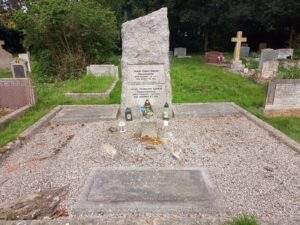
Conrad’s Grave
Conrad is buried in the municipal Canterbury cemetery, a rather lovely spot, which this April was awash with primroses, Anemone blanda and violets. More Englishness. But Conrad’s tomb feels somewhat alien to that, granite and gravel, emblematic stones or fading flowers left as tributes, but with a sense of abandonment. Keith Carabine, general editor of Wordsworth Editions, took Seamus Heaney to visit Conrad’s resting place when Heaney gave the Eliot lectures (1986) at the University of Kent. When I go that way to pay tribute myself, I can enjoy the sense of treading in Heaney’s footsteps. Heaney would have been well aware of the many strains and tensions in Conrad’s writing life, growing up as he did an Irish Catholic in a British-governed Northern Ireland. Conrad, when he spent time in the Congo, met and befriended Roger Casement, British consul who led a ground-breaking inquiry (1905) into the atrocities perpetrated by King Leopold, exposing the naked commercial considerations behind the running of the Congo. Casement in turn was to fall foul of the British Empire, retiring from his consular duties in 1913 and henceforth committing himself to the Irish Republican cause. During World War One he embroiled himself with the Germans to bring arms to Ireland, in the cause of Irish independence. Charged with treason, Casement was further smeared with rumours about his homosexuality, based on extracts from his diaries, the verity of which has never been established. This turned public opinion against his being treated with clemency. He was executed in 1916.
The workings of the British imperialist enterprise run through our history, and through our literature too. Not to see that is to ignore the richness of the connections between, for example, Conrad and Heaney, as well as to ignore the human sufferings which have sometimes been minimised in the interest of great literature. Achebe himself didn’t ask that we stop reading Conrad’s Heart of Darkness; only, he says:
I’m demanding that my reading stand beside [these] other readings … Although he’s writing good sentences, he’s also writing about a people, and their life. And he says about these people that they are rudimentary souls … The Africans are the rudimentaries, and then on top are the good whites. Now I don’t accept that, as a basis for … As a basis for anything.
Who are ‘we’ to speak against those, like Achebe, dispossessed by the text? Suddenly the principle of power turns itself round, and those who Conrad may be seen as privileging are disempowered by their own privilege. That’s not a comfortable position. But it’s not as uncomfortable as being dismissed as ‘rudimentary’.
Conrad died in August 1924, having declined the offer of a knighthood earlier that year. As his funeral cortege moved through Canterbury, the solemnity of the occasion was disrupted by the shenanigans of Cricket Week, a coincidence which was lamented by Edward Garnett who had arranged the funeral:
To those who attended Conrad’s funeral in Canterbury during the Cricket Festival of 1924, and drove through the crowded streets festooned with flags, there was something symbolical in England’s hospitality and in the crowd’s ignorance of even the existence of this great writer.
Almost 100 years later, Canterbury Cricket Week, itself an expression of a particular sort of identity, has dwindled. Ukraine, Conrad’s birthplace, is once more threatened by Russian power. Conrad’s name remains celebrated and his novel, Heart of Darkness, remains widely read, likewise Chinua Achebe and his novel Things Fall Apart. And suddenly Empire is on the agenda, making us look again at our history and our literature. Perhaps we should take Heart of Darkness off the list of great books (and perhaps there shouldn’t be a list of great books). But we should not stop reading it. Achebe himself says so.
Main image: Village reflections, Congo river, Democratic Republic of Congo Credit: Tracy Angus-Hammond / Alamy Stock Photo.
All other images are by Sally Minogue
Books associated with this article
